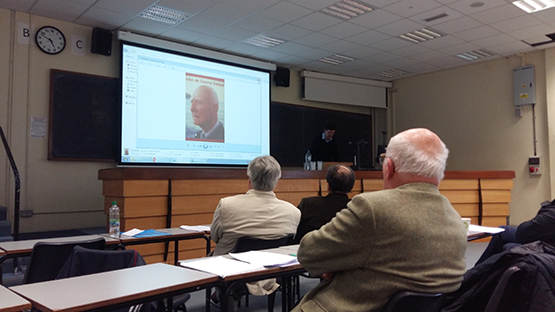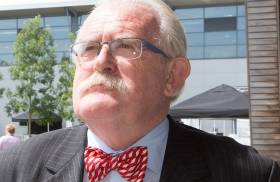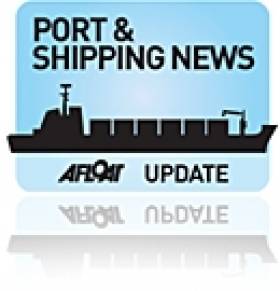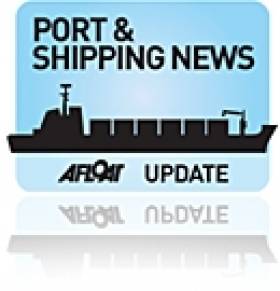Displaying items by tag: Maritime History
Podcast: Maritime History, Clipper Race, New 'Atlantic' Docu on RTE One
Hello and welcome aboard this week’ s edition of your maritime programme, the one thousand four hundredth edition of Seascapes ...this week we talk to Dr Deirdre Ni Conghaile of NUI Galway one of the speakers at last weekend’s Conference in University College Cork ; we congratulate yachtsman and offshore sailor Mark Light on being appointed as Race Director of the Clipper Round the World Yacht Race ; Grainne McPolin on the Oyster Season in Tralee Bay and we hear the winning entries in the Write By the Sea Literary Festival held in Kilmore Quay earlier this year with “The Vigil” by Imelda Carroll of Wexford and “My Friend Never Saw the Sea” by Mary Kavanagh from Wicklow ....music from Jerry Early and “I’ll Go” marking the loss of lives to the sea off Arranmore Island in Donegal in 1940 and do make a note not to miss “Atlantic “ the excellent documentary from Richie O Donnell which is being screened this coming week on RTE One television on Thursday next 8th of December @ a quarter past ten.................First this week to Grainne McPolin who went aboard Solitaire in Tralee Bay a few weeks ago for Seascapes at the start of the Oyster Season ......
Grainne McPolin on board the Solitaire at the start of this years Oyster season ......
Former Derry-Londonderry skipper and offshore sailor Mark Light, 45, has been appointed Race Director of the unique Clipper Round the World Yacht Race...
An experienced sailor with many ocean crossings and over 120,000 nautical miles to his name, Mark competed in the Clipper 2011-12 Race as Skipper of the Derry-Londonderry team before becoming Deputy Race Director in 2012. With four years’ experience assisting the race planning, he is now looking forward to stepping up to the lead role, one of the most challenging that exists in global sailing.
Bird Watch Ireland launched a new report “ Life on the Edge “ Seabirds and fisheries in Irish waters .....last Friday which explores the interactions between fisheries and seabirds including the knock-on effects of food shortages on seabird breeding success; the impacts of seabird by catch and the opportunities to implement measures which will directly benefit seabirds.
A task force of is to be set up immediately to protect the Curlew, one of Ireland's most threatened breeding bird species. This was one of the main actions which arose out of the Curlew in Crisis workshop, which took place in Co. Westmeath in November. The workshop brought together almost 100 scientists and conservationists from across Ireland and the UK to discuss the crisis facing breeding Curlew in Ireland. Results from a survey funded by the National Parks and Wildlife Service over the last two years show that just 130 breeding pairs of this bird remain in the Republic of Ireland and that the species is facing extinction here within the next 10 years if emergency action is not taken. You can download a podcast of last week’s edition of Seascapes featuring Jim Wilson on the plight of the curlew...
Indeed I was on the banks of Lough Lein at the Lake Hotel in Killarney last weekend in magnificent weather and the range of bird life was wonderful including a resident curlew amongst the many other species....
Last weekend at the Maritime History Conference in University College Cork we met up with one of the speakers - musician, producer, broadcaster, writer and Research Associate, Digital Cultures Initiative, Moore Institute, at NUI Galway …… Dr Deirdre Ni Conghaile of NUI Galway .....we talked about her description of fishermen and coal miners being kindred spirits ......
Dr Deirdre Ni Conghaile , Research Associate , Digital Cultures Initiative, Moore Institute , NUI Galway ......as Deirdre mentioned ... “Atlantic “ is the new feature documentary from Risteard O’Domhnaill the film maker who made The Pipe . Narrated by Emmy Award-winning actor Brendan Gleeson, the film explores ocean resource mismanagement across Ireland, Norway and Newfoundland . When traditional fishing communities meet big oil and overfishing, what does the future hold ? Not to be missed......thats “Atlantic “ the excellent documentary from Richie O Donnell which is being screened this coming week on RTE One television on Thursday next 8th of December @ 10.15pm .
An extract from “I’ll Go” Composed by Jerry Early .....Remembering Arranmore islanders who lost their lives at sea in 1940 in the great loss of life at sea off the coast of one of our most beautiful offshore islands......you can download “I’ll Go” on itunes and read more on the Seascapes webpage.......
Next here on Seascapes to the winners of the inaugural Write By the Sea writing competition who are Imelda Carroll from Wexford for her prose piece, The Vigil, and Mary Kavanagh from Wicklow for her poem, My Friend Never Saw the Sea.”
Lucy Moore, Chairperson of the Write By The Sea organising committee, says “the judges, renowned writers, Billy Roche, Cat Hogan and Peter Murphy, were impressed with the high calibre of this year’s entries.......... So last week we invited Imelda and Mary to join us in the Seascapes studio to read their winning entries..first to Mary Kavanagh from Wicklow and her poem ...“My Friend Never Saw the Sea”
From Mary Kavanagh who is a keen radio fan to Imelda Carroll of Wexford who won the “Write By the Sea” literary festival in the short story category with her entry “The Vigil” ..
That’s it for this week here on your maritime programme....on the sound desk this week Bryan Fitzpatrick, until next Friday night tight lines and fair sailing”
German U boats 'Myths' Heard at Irish Maritime History Conference
Stories that abound in the West of Ireland concerning German U- boats refuelling and resupplying, or having pints in local pubs during World War Two appear to be "fanciful myths" the second annual Irish Maritime History Conference has been told writes Tom Mac Sweeney. The conference is being held this weekend at UCC. Delivering a paper on German espionage initiated by sea, Sam Moore from Sligo IT said there, in reality, been only three successful U-boat landings of German agents, two in Kerry and one in Sligo and only one agent had been even partially successful in his mission.
The conference heard from Jean Prendergast, wo has been researching Cork and the Great War that 70 Cork sailors were decorated for bravery during WW1.

Also at the conference today, tributes have been paid to Dun Laoghaire's long-time maritime figure and campaigner Dr.John de Courcy Ireland at the national maritime history conference in Cork.
Dr. John Mulqueen from Trinity College said he had spent a lifetime highlighting the potential of the sea as a natural resource.
‘Follow The Fleet’ Schools Essay Competition
Theme 1. Maritime History
Commodore John Barry- Father of the American Navy
The Adventures of Gráinne Mhaol
Admiral Francis Beaufort's Scale
Write an historical essay on one of these famous Irish mariners and their journeys of discovery and adventure. You can include pictures or photos if choosing this category to support your essay. The pictures or photos will need to include elements of geographical representation and can include pictures of vessels, land marks, vegetation or animals pertinent to the essay.
Theme 2. Maritime Trading in Ireland –Life of a Container
An essay on a trade route from or to Ireland and progress that a container carried on a cargo ship will make. You will need to describe the size of container, what cargo it will carry, the type of ship it will travel on, the port it will depart from and the port it will go to and the places the ship may call in-between. The nominated trade routes are:
Ireland – Norway.
Ireland – Italy.
Ireland- France.
You can include pictures or photos if choosing this category to support your essay. The pictures or photos will need to include elements of geographical representation of the two countries and can include pictures / photos of land marks or cargo pertinent to the Journey.
Theme 3. Technology and the Master Mariner.
An essay on how technology helps the working life of a ships captain. You can include details on the types of technology used aboard ship including:
Telecommunications on Ships
Navigating Ships and Technology
Technology & Safety at sea
Entrants can include pictures or photos if choosing this category to support your essay. The pictures or photos will need to be representative of the technology used on board ship.
You are free to choose an essay title from any of the 3 themes listed above. For further information about essay guidelines, entry forms and competition details and rules they can be found HERE
'Follow the Fleet' Schools Essay Competition
The Irish Maritime Development Office (IMDO) has announced details for the 2010/11 Follow the Fleet Schools Essay Competition. To enter the competition, schools are invited to log onto http://www.followthefleet.ie to register. Each school will be provided with a username and password.
This year the Follow the Fleet essay competition is centred on three themes: Maritime History, Maritime Trading in Ireland –Life of a Container and Technology and the Master Mariner. Within each theme there is a choice of three essay titles. You are free to choose an essay title from any of the themes listed.
To see the full list of essay titles, essay guidelines, entry forms,competition details and rules are please logon to http://www.imdo.ie/followthefleet/news.asp


























































